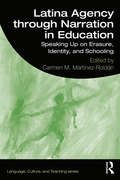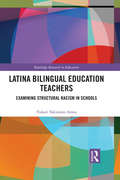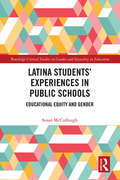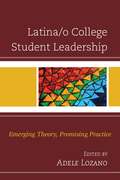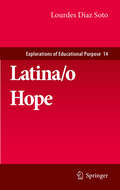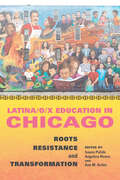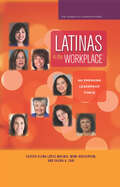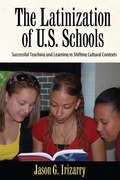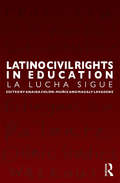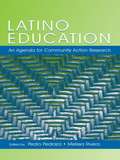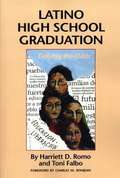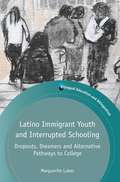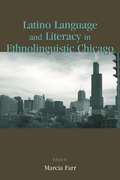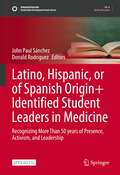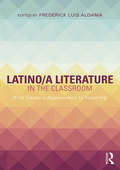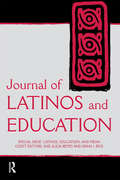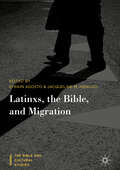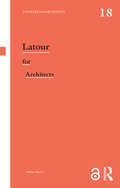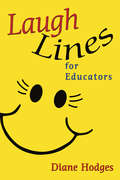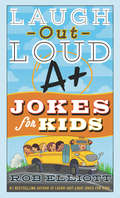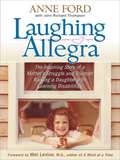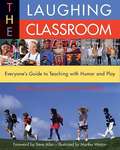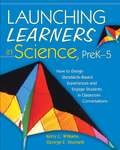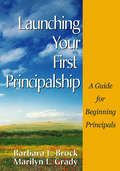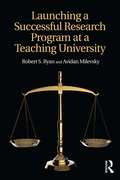- Table View
- List View
Latina Agency through Narration in Education: Speaking Up on Erasure, Identity, and Schooling (Language, Culture, and Teaching Series)
by Carmen M. Martinez-RoldanDrawing on critical and sociocultural frameworks, this volume presents narrative studies by or about Latinas in which they speak up about issues of identity and education. Using narratives, self-identification stories, and testimonios as theory, methodology, and advocacy, this volume brings together a wide range of Latinx perspectives on education identity, bilingualism, and belonging. The narratives illustrate the various ways erasure and human agency shape the lives and identities of Latinas in the United States from primary school to higher education and beyond, in their schools and communities. Contributors explore how schools and educational institutions can support student agency by adopting a transformative activist stance through curricula, learning contexts, and policies. Chapters contain implications for teaching and come together to showcase the importance of explicit activist efforts to combat erasure and engage in transformative and emancipatory education.
Latina Bilingual Education Teachers: Examining Structural Racism in Schools (Routledge Research in Education #22)
by Yukari Takimoto AmosUsing critical race theory and whiteness studies as theoretical frameworks, this book traces two Latina bilingual education teachers in three different professional phases: as paraprofessionals, teacher candidates, and certified teachers. Grounded in a longitudinal case study, this book sheds light on the effects of institutional racism when Latina/o educational professionals attempt inclusion in white dominant organizations, such as schools. Revealing and analyzing the structural racism present in schools and the obstacles it creates for professionals of color, the author exposes the racist practices that are hidden from view and offer practical solutions to combat them.
Latina Students’ Experiences in Public Schools: Educational Equity and Gender (Routledge Critical Studies in Gender and Sexuality in Education)
by Susan McCulloughFocusing on issues relating to gender, gender relations, and discrimination, this book provides nuanced insight into the experiences of young Latina women and their teachers in a North American middle school. Latina Students’ Experiences in Public Schools details how students navigate questions of gender, gender discrimination, and gender relations in the context of post-feminism, and in view of widespread claims that advocacy for girls and women has been outmoded by anti-discriminatory legislation. Drawing on an ethnographic study that focuses on gender segregation and dominance, relational identities, and the role of teachers in reinforcing gender dynamics, the text deftly demonstrates the effect of postfeminist policy and ideology on gender equity and achievement in public schools. In particular, the text illustrates that young Latina women continue to face both physical and verbal harassment on a daily basis, which is often overlooked by school faculty and administrators. A powerful and timely text, the volume advocates for action to counter school-based gender discrimination. This book will be of great interest to graduate and postgraduate students, researchers, academics, policy makers, libraries in the field of gender and sexuality in education, gender studies, secondary education and urban education.
Latina/o College Student Leadership: Emerging Theory, Promising Practice
by Lozano Guardia Susana Muñoz Moises Orozco Alicia Rodríguez Cristobal Salinas Cecilia Suarez Jesse Villalobos Nancy Barceló Cameron Beatty Eduardo Coronel Juan Escalante Juan Guardia Veronica Kann Corina Lopez Adele LozanoLatina/o College Student Leadership: Emerging Theory, Promising Practice examines Latina/o college student leadership and leadership development in higher education. This edited collection examines emerging frameworks, empirical research, leadership models, essays, and promising practices from the perspectives of scholars, educators, practitioners, and activists. Latina/o student leadership is analyzed through the lens of various institutional contexts (e.g. large research institution, community college, Hispanic-serving institution) as well as diverse intra-institutional contexts (e.g. academic, student organizations, student government, fraternities and sororities). The focus on theory and practice within various contexts, combined with an emphasis on student voice, helps provide deeper insight into how Latina/o students experience leadership in higher education, as well as how to promote and support the leadership development of Latina/o college students.
Latina/o Hope
by Lourdes Diaz SotoThere are an estimated forty-eight million Latinas/os living in the United States, roughly sixteen percent of the population. Not only are they the largest minority group in the country but also the youngest: one out of five children is Latina/o. The rise in the Latina/o population has caused for panic in some areas of the country, resulting in hostile and sometimes violent racism and xenophobia, and yet, much of that hatred is fueled not on facts but rather on myths about immigration. To date, most studies on immigration have been data driven, focusing on migrating groups or policy analyses. Latina/o Hope is different. It incorporates salient theories on migration as it moves toward a new theorizing, one that views immigration from the immigrant's perspective. Thus, it integrates research into the depiction of various slices of immigrant experience--the young women disappearing in the city of Juarez, the various students at various stages of their educational journeys, the young children in need of ESL programs, the ethnically-mixed immigrants, the undocumented workers, and others. Latina/o Hope discusses the impact of neoliberal policies and global capitalization on the daily lives of Latina/o immigrants, serving as an inspiration for dialogue, praxis and imagination to love and serve one another.
Latina/o/x Education in Chicago: Roots, Resistance, and Transformation (Latinos in Chicago and Midwest)
by Nilda Flores-González Lilia Fernández Jaime Alanís Ann M Avilés Gabriel Alejandro Cortez Erica R Dávila Cristina Pacione-Zayas Isaura Pulido Angelica Rivera Arlene Torres Mirelsie Velázquez Leticia Villarreal SosaIn this collection, local experts use personal narratives and empirical data to explore the history of Mexican American and Puerto Rican education in the Chicago Public Schools (CPS) system. The essays focus on three themes: the historical context of segregated and inferior schooling for Latina/o/x students; the changing purposes and meanings of education for Latina/o/x students from the 1950s through today; and Latina/o/x resistance to educational reforms grounded in neoliberalism. Contributors look at stories of student strength and resistance, the oppressive systems forced on Mexican American women, the criminalization of Puerto Ricans fighting for liberatory education, and other topics of educational significance. As they show, many harmful past practices remain the norm--or have become worse. Yet Latina/o/x communities and students persistently engage in transformative practices shaping new approaches to education that promise to reverberate not only in the city but nationwide. Insightful and enlightening, Latina/o/x Education in Chicago brings to light the ongoing struggle for educational equity in the Chicago Public Schools.
Latinas in the Workplace: An Emerging Leadership Force
by Mimi Wolverton Salwa A. Zaki Esther Elena López-MulnixLatinas in the Workplace highlights the stories of eight exceptional women. It is the third book in the Journeys to Leadership series that features stories about extraordinary women who have found paths to success in male-dominated arenas. Even though each took a different route to success, these women share an overarching, almost implicit, understanding of what they aspired to: the freedom to choose where and how to invest time and energy, to establish professional and personal balance, and enjoy the luxury of defining that balance.Despite their different professional aspirations, their journeys are rooted in similar ground tilled long before they entered the work world—a strong sense of family, influential religious traditions, and formidable ties to their cultural heritage. The eight Latinas showcased in this book – a foundation president, two business CEOs, a doctor, a former college president, a teacher and author, and two school superintendents – grew up with a determination to get educated that was fostered by parents and grandparents. All of them hold advanced degrees. Engrained in each of them is a sense of honor, the need to treat others with respect, and an inner strength—qualities nurtured by family members. While each had to contend with negative forces, whether from within or outside their culture, and drew strength from the experience, they also acknowledge that being able to navigate two cultures, and being bilingual, has given them a unique perspective and two distinct ways of dealing with people. Although Latinos constitute one of the fastest growing segments of our population, these Latina leaders represent a relatively small percentage of women in leadership in the United States. They hope that their stories inspire not only their contemporaries but the next generation of Latinas as well. The women profiled in this book are: Sarita Brown, President, Excelencia in Education; Tina Cordova, President, Queston Construction; Sally Garza Fernandez, President, Fernandez Group; Carmella Franco, Superintendent, Woodland California School District; Christine Johnson, former President, Community College of Denver; Thelma López-Lira, M.D.Darline Robles, Executive Officer for the Los Angeles County Office of Education; Beatriz Salcedo-Strumpf, Author and Instructor at the State University of New York in Oswego.
Latinization of U.S. Schools: Successful Teaching and Learning in Shifting Cultural Contexts (Series in Critical Narrative)
by Jason IrizarryFueled largely by significant increases in the Latino population, the racial, ethnic, and linguistic texture of the United States is changing rapidly. Nowhere is this 'Latinisation' of America more evident than in schools. The dramatic population growth among Latinos in the United States has not been accompanied by gains in academic achievement. Estimates suggest that approximately half of Latino students fail to complete high school, and few enroll in and complete college. The Latinization of U.S. Schools centres on the voices of Latino youth. It examines how the students themselves make meaning of the policies and practices within schools. The student voices expose an inequitable opportunity structure that results in depressed academic performance for many Latino youth. Each chapter concludes with empirically based recommendations for educators seeking to improve their practice with Latino youth, stemming from a multiyear participatory action research project conducted by Irizarry and the student contributors to the text.
Latino Civil Rights in Education: La Lucha Sigue (Series in Critical Narrative)
by Anaida Colon-Muniz Magaly LavadenzLatino Civil Rights in Education: La Lucha Sigue documents the experiences of historical and contemporary advocates in the movement for civil rights in education of Latinos in the United States. These critical narratives and counternarratives discuss identity, inequality, desegregation, policy, public school, bilingual education, higher education, family engagement, and more, comprising an ongoing effort to improve the conditions of schooling for Latino children. Featuring the perspectives and research of Latino educators, sociologists, historians, attorneys, and academics whose lives were guided by this movement, the book holds broad applications in the study and continuation of social justice and activism today.
Latino Education: An Agenda for Community Action Research
by Pedro Pedraza Melissa RiveraThis landmark volume represents the work of the National Latino/a Education Research Agenda Project (NLERAP)-an initiative focused on school reform and educational research with and for Latino communities. NLERAP's goal is to bring together various constituencies within the broad Latino community who are concerned with public education to articulate a Latino perspective on research-based school reform, and to use research as a guide to improving the public school systems that serve Latino students and to maximizing their opportunities to participate fully and equally in all social, economic, and political contexts of society. Latino Education: An Agenda for Community Action Research conceptualizes and illustrates the theoretical framework for the NLERAP agenda and its projects. This framework is grounded in three overlapping areas of scholarship and activism, which are reflected within the chapters in this volume: critical studies, illuminating and analyzing the status of people of color in the United States; Latino/a educational research, capturing the sociohistorical, cultural, and political schooling experiences of U.S. Latino/a communities; and participatory action research, exemplifying a liberation-oriented methodology for truly transformative education. The volume includes both descriptive educational research and critical analyses of previous research and educational agendas related to Latino/a communities in the United States. According to current U.S. Census data, Latinos now comprise the largest minority group in the total U.S. population. Historically, reflecting larger sociohistorical and economic inequalities in U.S. society, the Latino community has not been well served by U.S. public school systems. More attention to the Latino students' educational issues is needed to redress this problem, especially given the tremendous population increase and projected growth of Latino communities in the U.S. Latino Education: An Agenda for Community Action Research is a major contribution toward this goal.
Latino High School Graduation: Defying the Odds
by Harriett D. Romo Toni FalboWhile high school drop-out rates have steadily declined among white and African American students over the last twenty years, a constant 35 percent of Latino students continue to quit school before graduation. In this pioneering work, Harriett Romo and Toni Falbo reveal how a group of at-risk Latino students defied the odds and earned a high school diploma. Romo and Falbo tracked the progress of 100 students in Austin, Texas, from 1989 to 1993. Drawing on interviews with the students and their parents, school records, and fieldwork in the schools and communities, the authors identify both the obstacles that caused many students to drop out and the successful strategies that other students and their parents pursued to ensure high school graduation. The authors conclude with seven far-reaching recommendations for changes in the public schools. Sure to provoke debate among all school constituencies, this book will be required reading for school administrators, teachers, parents, legislators, and community leaders.
Latino Immigrant Youth and Interrupted Schooling
by Marguerite LukesThis book offers an innovative look at the pre- and post-migration educational experiences of immigrant young adults with a particular focus on members of the Latino community. Combining quantitative data with original interviews, this book provides an engaging and nuanced look at a population that is both ubiquitous and overlooked, challenging existing assumptions about those categorized as 'dropouts' and closely examining the historical contexts for educational interruption in the chosen subgroup. The combination of accessible prose and compelling new statistical data appeals to a wide audience, particularly academic professionals, education practitioners and policy-makers.
Latino Language and Literacy in Ethnolinguistic Chicago
by Marcia FarrThis volume--along with its companion Ethnolinguistic Chicago: Language and Literacy in the City's Neighborhoods--fills an important gap in research on Chicago and, more generally, on language use in globalized metropolitan areas. Often cited as a quintessential American city, Chicago is, and always has been, a city of immigrants. It is one of the most linguistically diverse cities in the United States and home to one of the largest and most diverse Latino communities. Although language is unquestionably central to social identity, and Chicago has been well studied by scholars interested in ethnicity, until now no one has focused--as do the contributors to these volumes--on the related issues of language and ethnicity. Latino Language and Literacy in Ethnolinguistic Chicago includes: *ethnographic studies based in home settings that focus on ways of speaking and literacy practices; *studies that explore oral language use and literacy practices in school contexts; and *studies based in community spaces in various neighborhoods. It offers a rich set of portraits emphasizing language use as centrally related to ethnic, class, or gender identities. As such, it is relevant for anthropologists, sociologists, linguists, historians, educators and educational researchers, and others whose concerns require an understanding of "ground-level" phenomena relevant to contemporary social issues, and as a text for courses in these areas.
Latino, Hispanic, or of Spanish Origin+ Identified Student Leaders in Medicine: Recognizing More Than 50 years of Presence, Activism, and Leadership (Sustainable Development Goals Series)
by John Paul Sánchez Donald RodriguezThis book explores the rich history and current state of the Latina, Latino, Latinx, Latine, Hispanic, or of Spanish Origin+ (LHS+) community’s representation, activism, and leadership within American medicine. It meets the demand for a reference that highlights both the underrepresentation and growth of the LHS+ community in medicine, especially as the LHS+ population now represents the largest non-white ethnic group in the United States. It examines the LHS+ community’s unique health issues and disparities, its ongoing efforts to address such health issues, and its approaches and challenges to developing generations of physicians and healthcare leaders. An Open-Access reference and Sustainable Development Goals Series volume, this book serves as an informative and inspirational resource for educational programming, drafting of policies and procedures, and institutional strategic planning. Across 16 chapters, LHS+ community members and leaders share their unique experiences in pursuing medical careers, using compelling narratives crafted to inspire more LHS+-identified college students to become healthcare professionals and leaders themselves. Additionally, chapters describe several ways in which non-LHS+ identified colleagues can better prepare themselves and their respective institutions to advance health equity for LHS+ communities, support LHS+ learners at all stages of medical education, and bolster current and future LHS+ faculty and senior academic leaders. Latino, Hispanic, or of Spanish Origin+ Identified Student Leaders in Medicine: Recognizing More Than 50 Years of Presence, Activism, and Leadership is a unique and timely book meant to unite and empower current and future physicians through service, mentorship, and education for the benefit of historically underserved communities in the U.S. and beyond.
Latino/a Literature in the Classroom: Twenty-first-century approaches to teaching
by Frederick Luis AldamaIn one of the most rapidly growing areas of literary study, this volume provides the first comprehensive guide to teaching Latino/a literature in all variety of learning environments. Essays by internationally renowned scholars offer an array of approaches and methods to the teaching of the novel, short story, plays, poetry, autobiography, testimonial, comic book, children and young adult literature, film, performance art, and multi-media digital texts, among others. The essays provide conceptual vocabularies and tools to help teachers design courses that pay attention to: Issues of form across a range of storytelling media Issues of content such as theme and character Issues of historical periods, linguistic communities, and regions Issues of institutional classroom settings The volume innovatively adds to and complicates the broader humanities curriculum by offering new possibilities for pedagogical practice.
Latinos, Education, and Media: A Special Issue of the journal of Latinos and Education
by Xaé Alicia Reyes Diana I. RiosThe idea for this special issue arose when the Puerto Rican and Latino Studies Institute called together a small group of scholars during the Spring of 2001. Scholars presented discussions on contemporary issues facing U.S. Latinos, including topics on globalization, law, education, and communication. This collection will be of interest to scholars, educators, students, administrators, and policymakers concerned with advancing knowledge in critical education, language policy and the press, technology and education policy, selective skills in media reception, and critical analysis of popular television programming.
Latinxs, the Bible, and Migration (The Bible and Cultural Studies)
by Jacqueline M. Hidalgo Efraín AgostoThis book examines the conjunction between migration and biblical texts with a focus on Latinx histories and experiences. Essays reflect upon Latinxs, the Bible, and migration in different ways: some consider how the Bible is used in the midst of, or in response to, Latinx experiences and histories of migration; some use Latinx histories and experiences of migration to examine Biblical texts in both First and Second Testaments; some consider the “Bible” as a phenomenological set of texts that respond to and/or compel migration. Cultural, literary, and postcolonial theories inform the analysis, as does the exploration of how migrant groups themselves scripturalize their biblical and cultural texts.
Latour for Architects (Thinkers for Architects)
by Albena YanevaBruno Latour is one of the leading figures in Social Sciences today, but his contributions are also widely recognised in the arts. His theories ‘flourished’ in the 1980s in the aftermath of the structuralism wave and generated new concepts and methodologies for the understanding of the social. In the past decade, Latour and his Actor-Network Theory (ANT) have gained popularity among researchers in the field of architecture. Latour for Architects is the first introduction to the key concepts and ideas of Bruno Latour that are relevant to architects. First, the book discusses critically how specific methods and insights from his philosophy can inspire new thinking in architecture and design pedagogy. Second, it explores examples from architectural practice and urban design, and reviews recent attempts to extend the methods of ANT into the fields of architectural and urban studies. Third, the book advocates an ANT-inspired approach to architecture, and examines how its methodological insights can trace new research avenues in the field, reflecting meticulously on its epistemological offerings. Drawing on many lively examples from the world of architectural practice, the book makes a compelling argument about the agency of architectural design and the role architects can play in re-ordering the world we live in. Following Latour’s philosophy offers a new way to handle all the objects of human and nonhuman collective life, to re-examine the role of matter in design practice, and to redefine the forms of social, political and ethical associations that bind us together in cities.
Laugh Lines for Educators
by Diane HodgesA unique collection of humorous anecdotes, stories, and jokes, this entertaining book will lighten the day for educators and promote fun in the school environment.
Laugh-Out-Loud A+ Jokes for Kids: A 4-in-1 Collection (Laugh-Out-Loud Jokes for Kids)
by Rob ElliottThe #1 bestselling Laugh-Out-Loud Jokes for Kids series heads back to school with a collection of brand-new jokes that will have the whole class in stitches!A new class clown is in town: Rob Elliott’s #1 bestselling Laugh-Out-Loud Jokes for Kids series is back with a set of jokes to last the whole school year.With riotous jokes for every occasion—from chortling in the hallways to cackling on the bus—these instant classics full of fresh, clean humor will keep the whole school quaking with laughter!How do bees get to class?They take the school buzz!
Laughing Allegra: The Inspiring Story of a Mother's Struggle and Triumph Raising a Daughter with Learning Disabilities
by Anne Ford John-Richard ThompsonWhen Anne Ford, great-granddaughter of Henry Ford, learned that her four-year-old daughter Allegra’s “differences” were the result of severe learning disabilities, she faced a challenge that neither money nor position could ease. Desperate for answers, Anne sought out doctors, teachers, counselors, and others who could help her build a support network for herself and her daughter, while fighting the many common misconceptions and myths about learning disabilities.Now, in this fiercely honest and compelling memoir, Anne tells her story, writing movingly of her feelings as the mother of a learning disabled child. “I grew to accept that life is filled with uncertainty and that answers to the most simple, yet profound, questions such as ‘What is wrong with my daughter?’ can be elusive. I learned to be self-reliant in ways I never had before. I learned that every spark of optimism and hope was something to be nurtured and treasured because sometimes they were the only comfort available. And I learned that worry had entered my life.” In time, Anne Ford saw her daughter grow into a vibrant, loving, and independent adult with a passion for ice skating and a commitment to help other disabled children. Allegra Ford, now 32, lives independently and supported this book’s publication so “it could help other kids.” Anne’s experience led her to become a tireless activist on behalf of children and families faced with LD, including her service as Chairman of the Board of the National Center for Learning Disabilities from 1989 to 2001, and the writing of this book with John-Richard Thompson, an award-winning playwright and novelist. In addition to Anne’s personal story, Laughing Allegra includes four invaluable special sections: Answers to the most commonly asked questions about LD A resource guide on where to find help A discussion from a mother’s perspective on the challenges of homework, money, relationships, the work- place, and planning as the LD child and parents age A section on “Siblings and Secrets,” new in this paperback edition, inspired by Anne’s conversations with readers during her hardcover book tour.
Laughing Classroom: Everyone's Guide to Teaching with Humor and Play
by Diane Loomans Karen J. KolbergWhat distinguishes a boring classroom from a learning classroom? Laughter. This book helps move teachers from a ?limiting" teaching style to a ?laughing" style that inspires creativity and helps students learn faster and better. Cowritten by a former educator and the founder of a comedy improvisation company, The Laughing Classroom helps teachers ? and parents ? make learning fun while instilling self-esteem, solid work habits, and the joy of learning in children. Suggested activities involve silly songs, special dress days, vocabulary-building, observation, communication, social skills, and self-expression. The book gives teachers 50 ways to say ?you did OK," 15 play breaks, and humorous homework assignments to make the task fun. This edition includes a new introduction by the authors and a foreword by veteran comedian Steve Allen.
Launching Learners in Science, PreK5: How to Design Standards-Based Experiences and Engage Students in Classroom Conversations
by Kerry C. Williams George E. VeomettThe only way to teach science is to do science. The combination of teaching and doing involves three elements: knowing content, teachers knowing and understanding themselves as teachers and learners, and, most importantly, knowing children. Kerry C. Williams and George E. Veomett describe principles and requirements that reflect the National Science Education Standards for the active learning of science. They brilliantly identify key ingredients for primary students and outline the best course of action to aid their development as young scientists.Using research on cognitive and neural development and motivational theory from the work of Piaget and Vygotsky, this is an invaluable tool for teachers inexperienced in science. It will help you discover new ways to think about science and develop lessons that are rich, fun, and authentic for both you and your students.All educators will find examples, questions, stories, and thought-provoking ideas to give students a strong start in science achievement, plus: Six key elements to build into science instruction: observing, representing, organizing, patterning and questioning, experimenting, and sharing How-to's for incorporating inquiry, workshops, centers, and projects in primary and elementary classrooms A four-step system-choice, planning, doing, reviewing-that helps promote learning in science and across all subjects
Launching Your First Principalship: A Guide for Beginning Principals
by Dr Marilyn L. Grady Dr Barbara L. BrockEffectively hone your leadership skills, reduce stress, manage time and staff, and resolve conflicts with these confidence-boosting tips and tools.
Launching a Successful Research Program at a Teaching University
by Robert S. Ryan Avidan MilevskyThis practical guide addresses the challenges for building and maintaining a college research program in an environment that does not focus on supporting research activity and for those with a heavy teaching load. The challenges faced by teacher-researchers and solutions to issues are reviewed. The steps for maximizing research productivity are outlined: time management, obtaining research space and equipment and funding, recruiting and managing human subjects, and overcoming bureaucratic stumbling blocks. Chapters feature opening vignettes, examples, cases, figures, tables, summaries, suggested readings, and research references which provide a scientific grounding.Highlights include coverage of:-The latest time saving digital resources including automatic literature search alerts, Zotero for managing literature, Dropbox for sharing files, Open Science for managing workflow, and OpenSesame and OpenStax Tutor.-Strategies for recruiting subjects such as flyers and posting lab meeting minutes on a web page. - How to increase research productivity while still engaging in effective teaching.-The problems of the availability of human subjects and strategies for recruiting from classes, offering extra credit for research participation, and participation as a course requirement.- Using students as volunteer research assistants and strategies for recruiting and managing volunteers along with ethical considerations. -Bureaucratic stumbling blocks and strategies for overcoming those challenges.- How to use browser/word processor add-ons that store and organize literature in a searchable library and produce citations and reference lists. -The use of free open source software to design experiments and collect data and free cloud based resources to store electronic research files.The steps for maximizing research productivity are outlined in chapter 1: time management, obtaining research space and equipment and funding, recruiting and managing human subjects, and overcoming bureaucratic stumbling blocks, along with impediments and solutions for establishing a research program. Strategies to overcome time constraints including automatic literature searches, Zotero for managing your literature, Dropbox for sharing files, and the Open Science Framework for managing workflow are provided in Chapter 2. Chapter 3 provides tips on obtaining funding. Chapters 4 and 5 provide strategies for recruiting and managing research participants such as ad hoc recruiting from classes, offering extra credit for research participation, and participation as a course requirement. The book concludes with a review of other items to consider when developing a research program.Intended for professional development or teacher training courses offered in masters and doctoral programs in colleges and universities or as a supplement in graduate level research methods courses, this book is also an invaluable resource for faculty development centers and university administrators. Designed for both early career and veteran teacher-researchers looking to enhance their research productivity, this book appeals to college teachers of all levels and disciplines.
